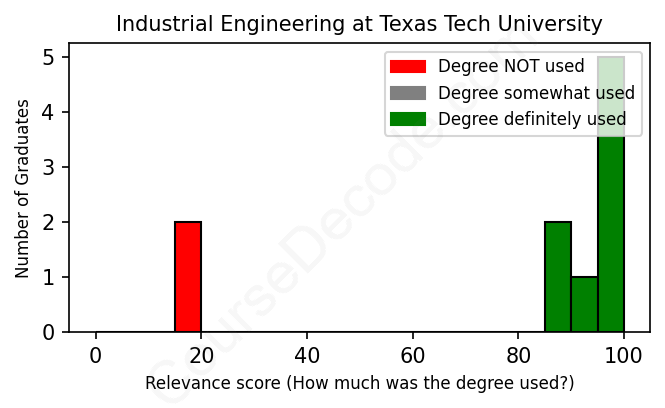
First, some facts. Of the Industrial Engineering graduates from Texas Tech University we've analyzed , here's how many have used (or NOT used) their degree in their career:

These are estimates based on AI analysis of 10 LinkedIn profiles (see below).
The verdict? Significantly above average. Overall, with an average relevance score of 79%, Industrial Engineering graduates from Texas Tech University have a much higher likelihood (+12%) of finding work in this field compared to the average graduate across all fields:
And for comparison, here's the chart for all profiles we've looked at across all degrees.
Also, after graduating, only 30% of these graduates have pursued further education other than another Bachelor's degree (such as a Masters degree or other), compared to the average across all profiles of 35%. This suggests a Bachelors degree is enough for most Industrial Engineering graduates, and it's normal to look for work straight after graduation.
See the details:
|
Relevance score: 100% We think this person has gone into a career highly relevant to their degree. We think this person has gone into a career highly relevant to their degree.
DEGREE INFOGraduated in 2022 from Texas Tech University with a Bachelor of Engineering - BE in Industrial Engineering. No other secondary education since. JOB HISTORY SINCE GRADUATIONPerformance Improvement Intern UMC Health System May 2022 - Dec 2022 Performance Improvement Analyst  UMC Health System Dec 2022 - Present ABOUTI graduated in December 2022 from Texas Tech University with a bachelor's degree in Industrial Engineering. I interned and worked part-time at University Medical Center from May 2022 - December 2022. I now work full-time at UMC in the Performance Improvement department as a Performance Improvement Industrial Engineer. I enjoy being able to apply the engineering skills I learned to a healthcare setting, and I look forward to a career in this field. |
The top 10 most common jobs done by the graduates we've analyzed (ranked most common to least) are:
So, when looking at the jobs people with an Industrial Engineering degree from Texas Tech University have taken on, there’s a pretty mixed bag of options. A lot of them have jumped into roles that seem directly connected to industrial engineering, like Manufacturing Engineers, Quality Engineers, and Project Engineers, where they get to use their skills in process optimization and efficiency. On the flip side, there are quite a few who have landed in jobs like consultants, business analysts, and even sales engineers, where their engineering background might not be the main focus. These roles lean more towards business management or consulting, which isn't quite the same as applying hardcore engineering principles.
Overall, while many graduates have found positions that are very relevant to what they learned in school, a significant number have shifted to roles that don’t fully utilize their industrial engineering training. It seems like there's a blend between those who stick closely to the engineering side of things and those who end up in more general or managerial roles, where their degree might help but isn't the main selling point. It's pretty interesting to see how diverse the job paths can be for industrial engineering graduates, but it does make you wonder if they always feel like they're using their full potential.
Here is a visual representation of the most common words in job titles for Industrial Engineering graduates (this is across all Industrial Engineering graduates we've analyzed, not just those who went to Texas Tech University):

So, looking at the career paths of Industrial Engineering graduates from Texas Tech University, it's pretty clear that many of them have landed solid jobs related to their field right after graduation. For example, those who graduated in 2010 and 2011 started off in roles like Industrial Sales Engineer or Industrial Engineer at well-known companies. This trend continues with graduates from more recent years who have also secured positions such as Quality Engineer or Project Engineer at notable organizations like Lockheed Martin and Raytheon. It seems that their first jobs often tie directly into engineering roles, which is a great sign because it shows that these graduates are not just finding random jobs, but ones that utilize their education and skills.
Fast forward about 5 to 10 years after graduating, many of these individuals seem to be advancing into higher positions, often taking on management or specialized roles. For instance, some have moved up the ranks to become project managers, systems integration analysts, and even senior engineers. This indicates that their educational background, combined with a few years of experience, allows them to continue climbing the professional ladder in areas that are relevant to Industrial Engineering. Overall, it looks like most graduates from Texas Tech in this field are doing pretty well and building successful careers in engineering and technology, making it a great choice for anyone considering this degree!
Honestly, a Bachelor’s degree in Industrial Engineering can be pretty challenging, and Texas Tech is no exception. You’ll dive into a mix of math, science, and engineering principles, which can get pretty intense, especially with all the problem-solving and analysis involved. While it's definitely manageable with some dedication and good study habits, it’s not exactly a walk in the park either. If you're the kind of person who enjoys tackling complex problems and has a knack for quantitative subjects, you’ll find it a bit easier, but definitely expect to put in some hard work. So, if you're curious about it, be ready to roll up your sleeves!
Most commonly, in the LinkedIn profiles we've looked at, it takes people 4 years to finish a Bachelor degree in Industrial Engineering.
Looking at the career paths of these Industrial Engineering graduates from Texas Tech University, it seems like many of them have found decent jobs and likely made good money along the way. The earlier graduates worked their way up in established companies like Eaton and Lockheed Martin, which typically offer solid salaries and benefits. Even those who ventured into owning their businesses seem to have stayed busy, suggesting some level of success. As you check out the more recent grads, they are also landing jobs in reputable companies or moving up the ranks pretty quickly. Overall, it looks like these folks are doing well financially, especially compared to what many new graduates face when starting their careers.
Here is a visual representation of the most common words seen in the "about" section of LinkedIn profiles who have a Bachelor degree in Industrial Engineering (this is across all Industrial Engineering graduates we've analyzed, not just those who went to Texas Tech University). This may or may not be useful:

Here are all colleges offering a Bachelor degree in Industrial Engineering (ordered by the average relevance score of their Industrial Engineering graduates, best to worst) where we have analyzed at least 10 of their graduates:
| College | Score | Count |
|---|---|---|
 Iowa State University Iowa State University
|
88 | 11 |
 North Carolina State University North Carolina State University
|
87 | 12 |
 California Polytechnic State University-San Luis Obispo California Polytechnic State University-San Luis Obispo
|
87 | 15 |
 Texas A&M University Texas A&M University
|
83 | 39 |
 Purdue University Purdue University
|
81 | 36 |
 University of Central Florida University of Central Florida
|
80 | 23 |
 Georgia Institute of Technology Georgia Institute of Technology
|
80 | 59 |
 Penn State University Penn State University
|
79 | 16 |
 Texas Tech University Texas Tech University
|
79 | 10 |
 University of Pittsburgh University of Pittsburgh
|
79 | 15 |
 University of Washington University of Washington
|
78 | 12 |
 University of Arkansas University of Arkansas
|
78 | 11 |
 University of Wisconsin-Madison University of Wisconsin-Madison
|
76 | 13 |
 University of Illinois at Urbana-Champaign University of Illinois at Urbana-Champaign
|
73 | 15 |
 West Virginia University West Virginia University
|
71 | 19 |
 Clemson University Clemson University
|
69 | 23 |
 University of Florida University of Florida
|
64 | 11 |